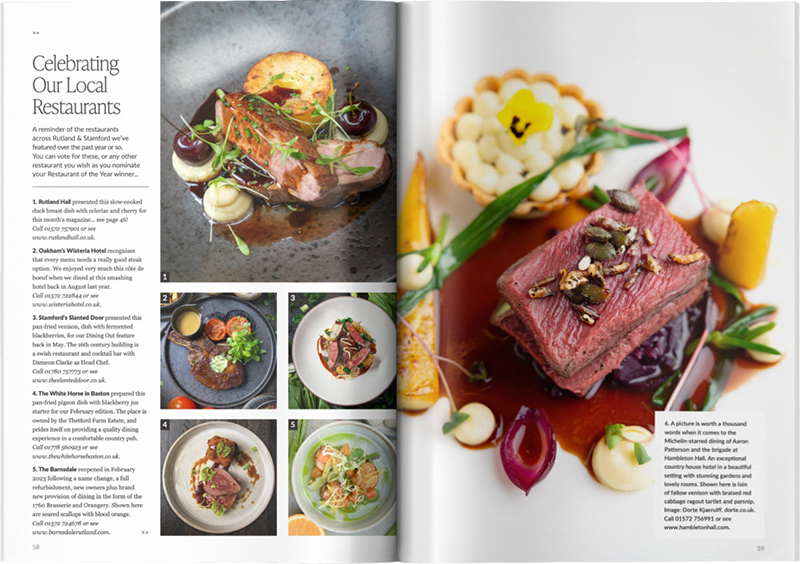
Five Years as MP: Alicia Kearns
Next month will mark five years since Alicia Kearns entered the Houses of Parliament for the first time as a sitting MP. This year Rutland voted to retain her as their representative, and now the constituency also includes Stamford… time for a catch up, we thought!

They say a week is a long time in politics, let alone a month or two. It’s been slightly longer than that since I last spoke to Rutland & Stamford’s MP Alicia Kearns. At the 10th anniversary garden party of the For Rutland charity in June we were exactly a month away from the general election. Alicia will have represented Rutland for five years next month and thanks to a constituency border change she now represents Stamford too, looking after a diverse area in metaphorical or meteorological rain or shine…
“I was out in all weathers prior to the election, knocking on doors,” says Alicia. “And whilst I was hoping to have a few more months to introduce myself to the people of Stamford, thankfully some communities in the new area had been affected by some of my work already.”
“I was doing about 25,000 steps every day and knocked on 6,000 doors during the campaign. The overriding response was ‘oh yes, you’re the lady that gets things done!’ particularly with reference to my work campaigning against the Mallard Pass solar development and local issues.”
To the universal dismay of everyone in the constituency, Ed Miliband as the new Secretary of State for Energy Security & Net Zero has given the greenlight to the Mallard Pass solar farm, doubtless keen to be seen as making ‘big decisions.’ His approval of the 2,105-acre site, which Alicia has vigorously campaigned against for a number of reasons, means that the final say over the site is no longer one over which South Kesteven, Lincolnshire or Rutland district or county councils are able to overturn.
“Everyone’s a bit heartbroken by a railroading of these mega solar plants in his first week. He wanted to be able to deliver a big news announcement even though civil servants actually told him not to approve at least one of them, and despite the decision being in complete contempt of community consent.”
“The development means we’re going to lose 6,200 acres of good quality agricultural land and that has implications for food security. The conflict in Ukraine should have taught us what happens in the event of reliance on international food supplies, when we produce just 60% of our own food.”
Alicia has also voiced concern over the use of Uyghur slave labour being used in the manufacturing supply chain of infrastructure for the development. Furthermore, there are concerns over the sheer scale of the development – equivalent to 1,300 football pitches and with a length of 4.2 miles, end to end – as well as the overall efficacy of solar power itself.
“I have a heavy preference for wind over solar power. What do we have an abundance of in this country? Wind. The same can’t be said of sunlight. We don’t yet have a grid system able to absorb a lot of solar and overall I think it’s one of the poorest forms of energy production.”
“We’ve masses of industrial sites, former RAF bases, and rooftops. Mallard Pass should not be this size, it should not be on agricultural land, it shouldn’t be this company and there are no meaningful plans for community compensation.”
As well as continuing to voice strong opposition to Mallard Pass, Alicia is also keen to improve the safety of the A1, named as one of the worst accident blackspots on the road with nearly 1,000 collisions recorded on the A1 between Peterborough and Blyth between 2015 to 2022.
“It’s one of my biggest priorities and last week I managed to secure a half-hour Adjournment Debate in the Chamber in which ministers had to come to the Commons to discuss safety on the stretch from Stamford to Little Ponton. Last year I secured five safety upgrades between Tinwell junction and Colsterworth, including the installation of lane markers and rumble strips.”
“In May I also secured a review by Highways England of all the central reservation crossings on that stretch of road. It’s going to take some time to complete, and I’ve urged them that if it’s possible to make the process faster I’d like them to do so, because those crossings and the short slip roads are responsible for a number of those accidents. I’ve even recommended the introduction of an entirely new road sign specifically indicating a short slip road as I think that would help to improve safety.”
“The main course of action, though, is driver education. If you look at data from the police, almost all accidents involve motorists on their phones, eating or otherwise distracted. My website is now hosting a petition calling on the Government and National Highways to continue to improve the safety of that stretch of road for all of its users.”
One of Labour’s other locally contentious election pledges was to end independent schools’ VAT exemption. The independent Schools’ Council is a membership organisation representing 1,400 independent schools and 500,000 children in the UK. In Rutland and Stamford, there are 11 independent schools with a total of 6,066 pupils enrolled, an eighth of the children in Rutland and Stamford, and a figure that includes over 1,000 pupils with special educational needs (SEN) plus the children of military families based in the area.
“It’s a policy that will impact us heavily,” says Alicia. “The sector also employs 2,100 people in the area, so jobs could be at risk as well as the education of the pupils in question. It will impact upon state schools too, because in the event that school fees rise and parents are unable to meet those increased costs, there’s no plan on how to deal with inflated class sizes and additional pressures which will fall on local state schools.”
“The striking thing about the policy is that it’s driven purely by dogma, and I made a point of order last week in the Commons on the subject because Labour is refusing to debate the issue, and have only made a written ministerial statement, essentially trying to silence us. I’ll keep using my voice in Parliament and continue trying to mitigate the worst excesses of what I think is a bad decision for the area.”
“If there’s a common concern among all of the decisions we’re seeing it’s the apparent lack of concern for the preservation of rural communities, from Mallard Pass to the need to protect agricultural land and protect areas from the risk of floods in the event that land is lost, to ending the exemption of VAT on independent schools and an announcement of a massive increase in housebuilding.”
“Rutland has now got to build 115% more houses on top of what the area was already constructing, South Kesteven has to build 33% more, so that’s a significant increase. I’ve always accepted that we need to have more houses, but we need to build them where jobs are and to ensure we create the right mix of housing. For example, more housing for younger people. That doesn’t seem to be what Labour is focusing on.”
“As an MP you’re always aware of how important it is to balance national interest with local impacts. I’m incredibly proud of the work I do locally and I try to only be in Parliament Mondays, Tuesdays and Wednesdays, returning home to visit local people, local businesses and local charities and ensure that the work we do is a reflection of their priorities.”
“As well as looking at issues like balancing infrastructure with community, there’s a chance to make a meaningful contribution to your community in the role. Earlier in 2024 I launched Rutland’s Great Dementia Conversation because there’s a degree of stigma and hesitancy around the condition. Around 944,000 people in the UK have been diagnosed with dementia and that figure is set to increase to beyond a million by 2030.”
“We want our communities to be as supportive as possible to those with the condition and their families, and to change how we see dementia, so I’m pleased to be restarting the campaign after it was suspended during the election. Stephen Fry has already voiced his support for the campaign and we’re fortunate that Angela Rippon is to visit the county soon to offer her support to the campaign too.”
“It’s a diverse job, and a demanding one, but not always a happy one because in the case of constituency work you’re normally helping people when something has gone wrong in their lives. Being an MP is an enormous privilege though and I feel a great deal of responsibility towards the people I serve.”
“It’s not possible to get everything right all the time, and by the time this is published we’ll be down to the final four candidates from six, determining who will lead the party going forward. The final two candidates will be known on 10th October, with the successor to Rishi Sunak named on 2nd November.”
“We lost the trust of the people. We need to rebuild that and demonstrate confidence, earning the right to be heard again. We need to deliver a credible platform that can return us to power within five years. We did a lot of good when we were in government, and I’m looking for a leader that can unite our party.”
“Having been chosen by colleagues to sit on the Party Board – the party’s national governing body – and as a member of the 1922 committee, I’m choosing to remain neutral as to the party’s next leader, but I really am optimistic for the future.”
As well as local and national interests, Alicia’s pre-MP life saw her working for the Ministry of Justice, Ministry of Defence and at the Foreign & Commonwealth Office, focused on countering terrorist groups and hostile states, attending peace talks on Syria, and working in Iraq, Kuwait, Ukraine, North Africa, Lebanon and beyond.
Later working as an independent consultant specialising in counter-terrorism, Alicia left the role to become an MP five years ago and in October 2022 became the youngest woman ever to chair any committee, and the first woman to chair the Foreign Affairs Committee, stepping back from the role when the election was called.
With that experience and within her new role as Shadow Minister for Foreign Affairs, opposite David Lammy, Alicia will bring her experience to international concerns too.
“I’m keen to maintain my involvement in guiding foreign policy. It’s a challenging role as you can never choose what your priorities are, since everything is a priority simultaneously. You can play a role in limiting loss of life in conflicts and shape long-term strategy, but unfortunately you don’t get to pick and choose what to prioritise and when.”
“The reality is that the Middle East is a priority, but so is the conflict between Russia and Ukraine, the long-term strategic threat that China represents, Lebanon’s part in the situation between Israel and Iran, as well as tensions in the Balkans, which I fear might see an outbreak of violence similar to that which happened in the 1990s.”
It has been five years since Alicia began work in the House of Commons as one of a cohort of 106 new MPs. Back in 2019 she told us that it was a bit like your first day in school, but with the whole world watching you and with the scent of beeswax polish on benches that could do with more padding, offices that could do with fewer mice and odd traditions like bobbing for the speaker’s attention.
In that time much has changed both in respect of the building itself – a newly refurbished Elizabeth Tower for instance – but in the country and around the world too. Covid, Brexit, a cost-of-living crisis, war in Ukraine and global tension between nations have all conspired to create challenging times for a hard-working MP.
What hasn’t changed though is the confidence that Rutland (and now Stamford too) places in Alicia to represent the area in Parliament. “It’s a unique job and an enormous privilege,” says Alicia. “Not always easy, but always very humbling and always very rewarding.”
See www.aliciakearns.com.
The Palaces of Westminster…
• Built for King Cnut c.1016. Curia Regis was the precursor to modern parliament, based within Westminster Hall. Royal residence was destroyed by fire 1512, another fire in 1834 destroyed much of the building when the Chancellor’s pile of tally sticks was set alight by an overheated stove. Charles Barry rebuilt the current estate from 1840-1876 in gothic revivalist style. Designated Grade I status in 1970.
• 1,100 rooms; 100 staircases; 112,476m2 floor area; three miles of corridors; 3,000 employees. The estate covers eight acres inc four acres of gardens/lawns. Ground floor offices, chambers, dining room. Top two floors are committee rooms and offices. Elizabeth Tower 96m tall, seven metre diameter clock faces, great bell ‘Big Ben’ is 13.8 tonnes. Restoration completed November 2022.
• Lords Chamber: 80ft, red theme. Origins in C11th/C13th. Now limited to 92 hereditary peers, 786 sitting members, origins 1265. Commons: 75ft, green theme, established 1707 by the Act of Union. Comprises 650 members, Sir Lindsay Hoyle current speaker, Lucy Powell is Leader of the House. 20 select committees, plus 15 additional committees.






